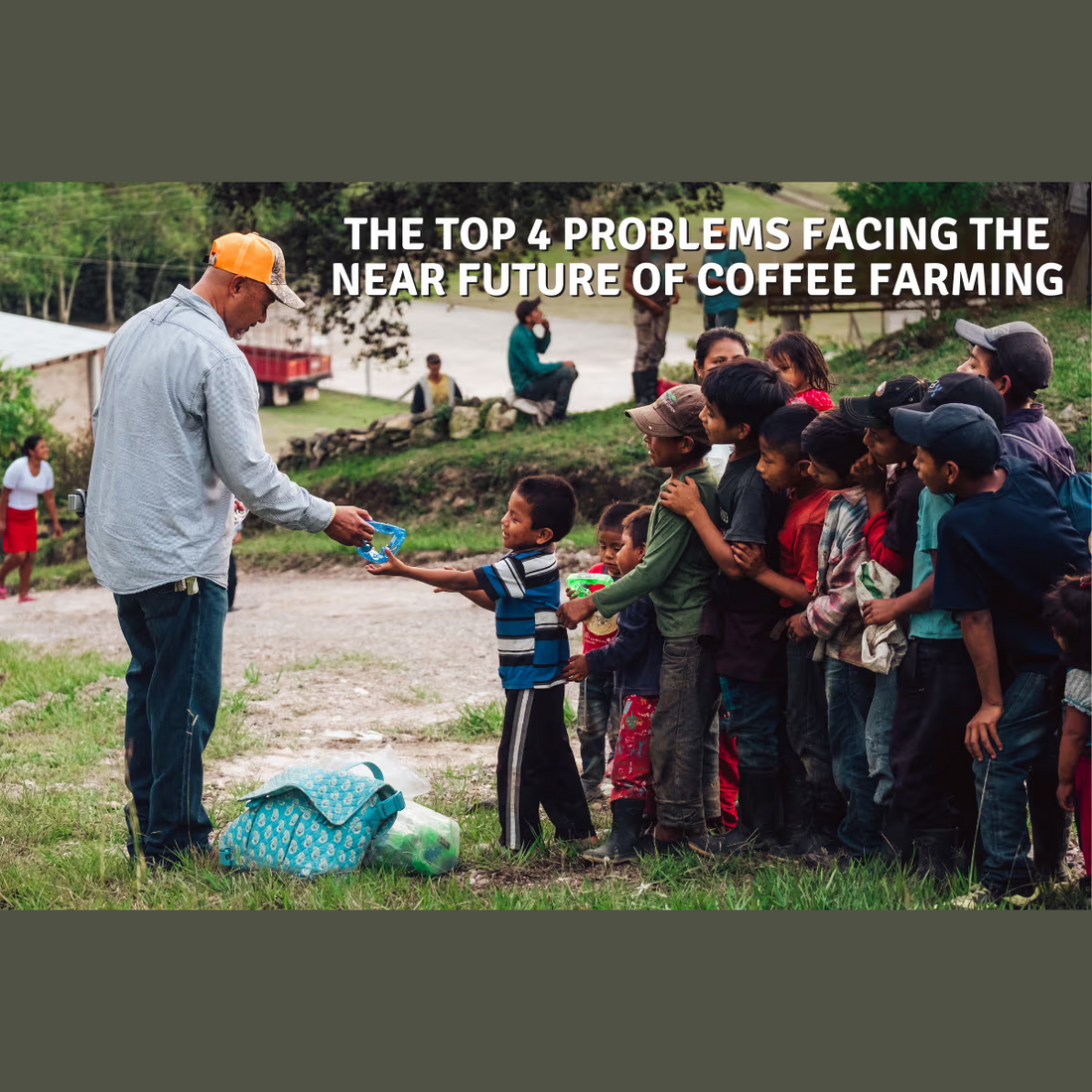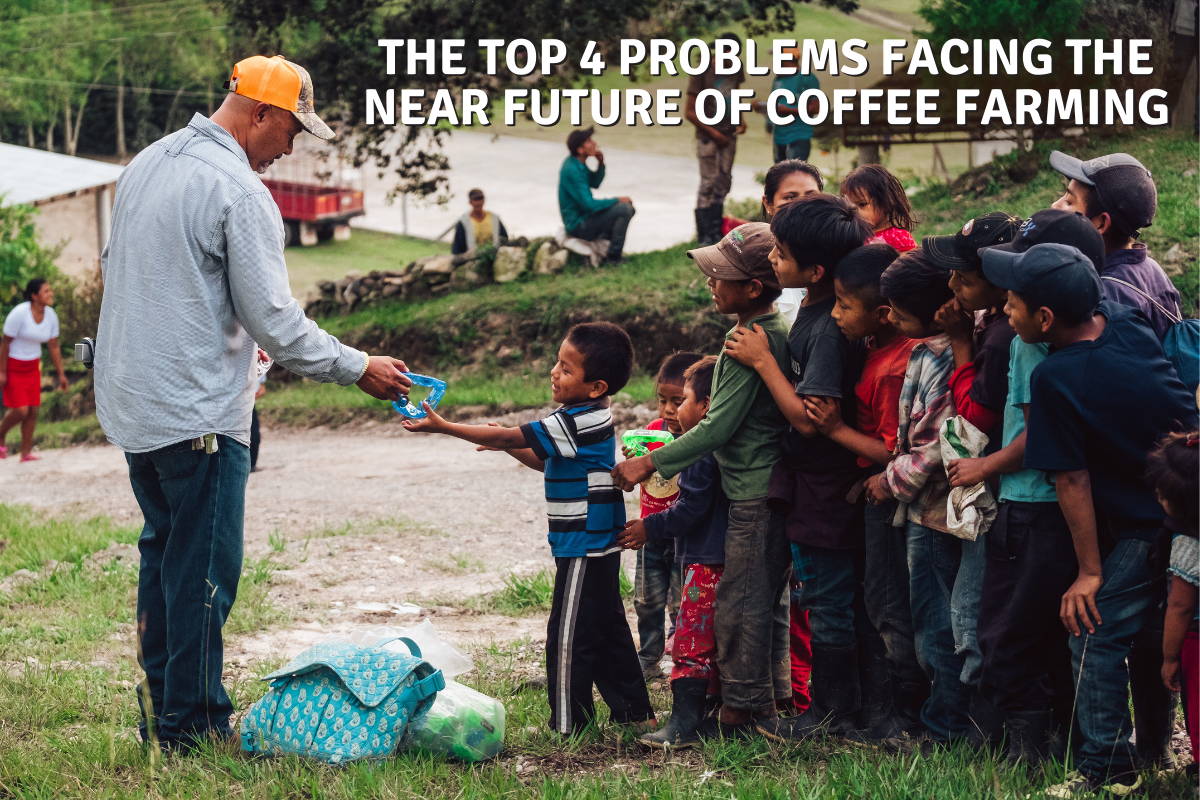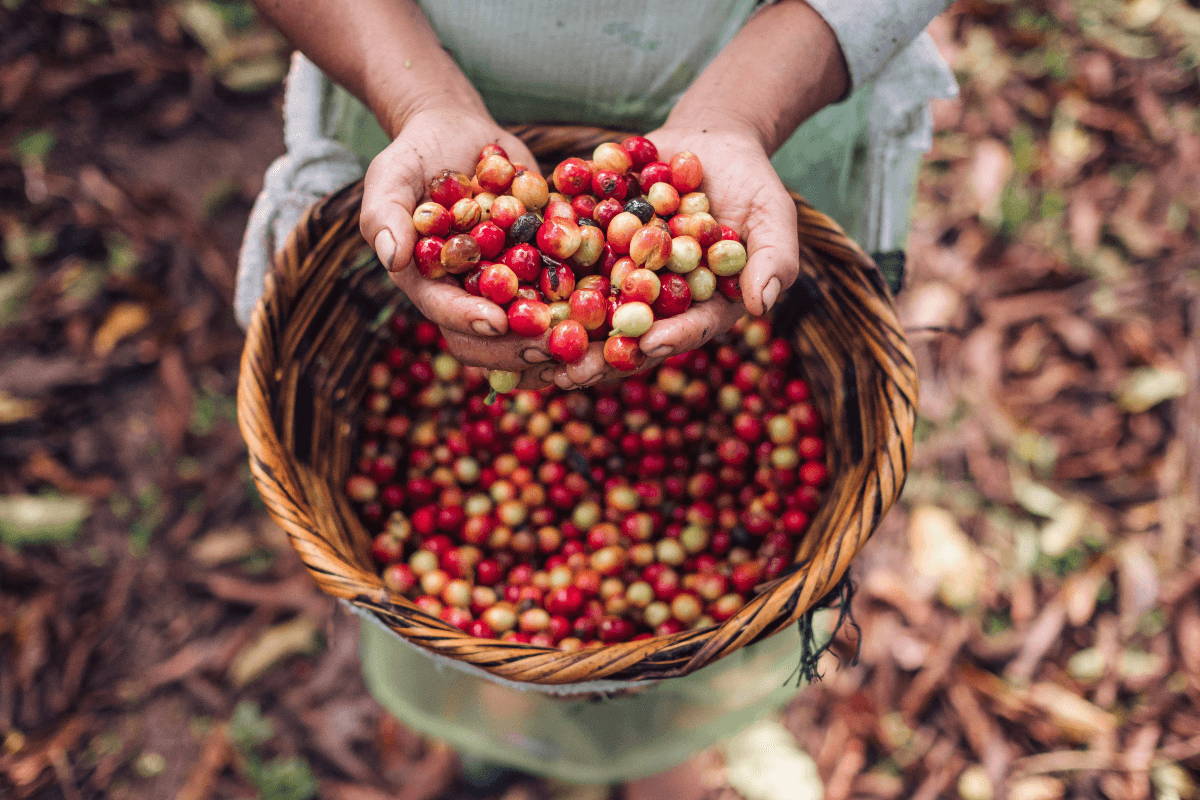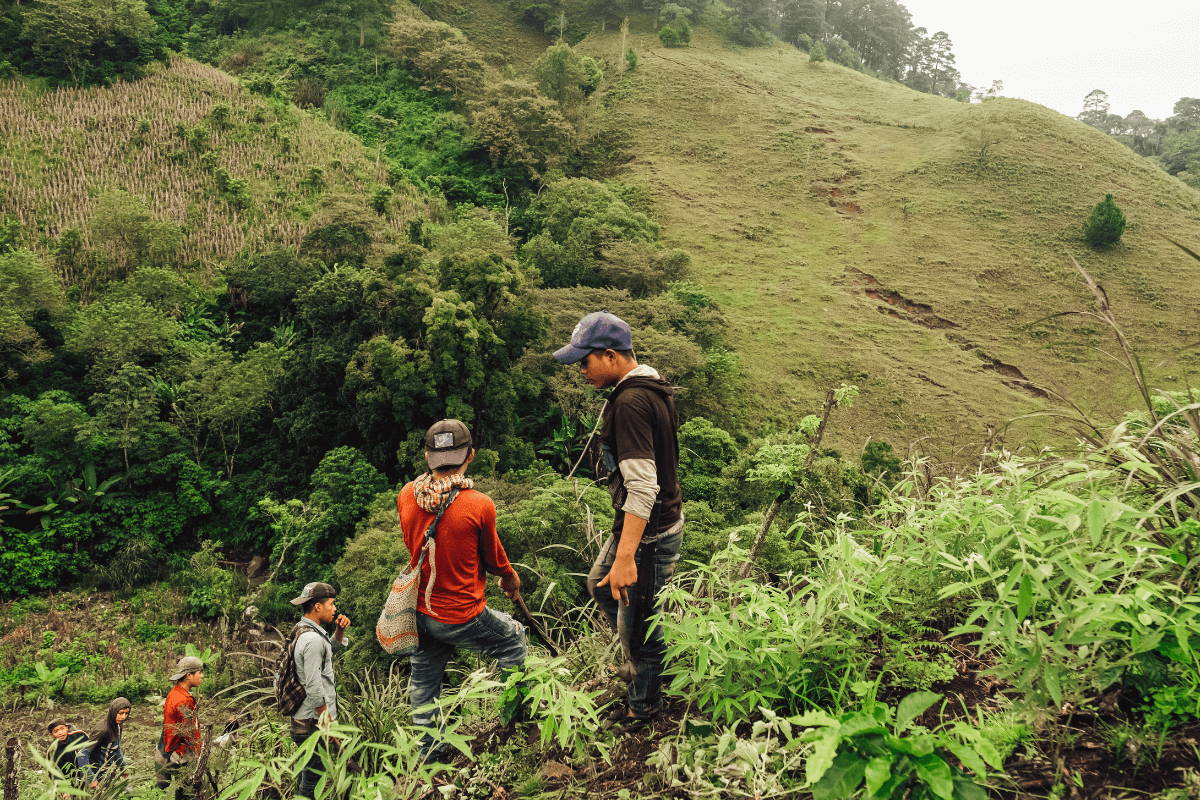
Top 4 Threats to the Future of Coffee Farming
Share
by: Marisa Hart
In these turbulent times, your morning cup of coffee can’t escape the world’s chaos, political unrest and COVID unpredictably. Coffee prices have spiked to a four year high in places like Brazil, Colombia, and Vietnam, and these increases are making waves across all facets of the coffee industry including the roasting and cafe side here in the United States. With all of these problems facing the industry, is there a way to help affect change?
This week's Alma-nac Blog will be covering the top four issues facing the coffee industry and explaining how they directly affect your morning cup. The good news is that you can choose to help combat these industry-wide problems by supporting small farmers that are working to resolve these issues.

Climate Change and Coffee
First and foremost, we have to talk about the elephant in the room that affects every single human no matter what their coffee drinking habits might be: climate change. We know this can be a controversial topic but as farmers ourselves, we have seen first hand the effects of climate change on our family farms.
Coffee, more specifically, is a picky crop that can’t thrive in just any climate. It prefers cool to warm tropical environments that average an annual temperature of 73°. Coffee also needs predictable rainy seasons to thrive.
Countries close to the equator like Brazil, Colombia, Honduras and Vietnam are the traditional coffee growing powerhouses. Honduras, where Alma’s family farm Finca Terrerito is located, is sixth in the world for coffee production.
The normally predictable weather patterns of the equatorial region are in upheaval, and it’s dramatically affecting the coffee market. A mid-July frost in Brazil, the world’s biggest grower of coffee, damaged at least 700 million pounds of coffee.

A drought on top of that has greatly reduced the country's 2022 harvest. The good news is that Brazil is expected to enter its rainy season in late September which could be crucial for the crops that survived the earlier weather woes.
In 2020 at Finca T, we experienced a 30% loss in production due to a longer and heavier rainy season. The drastic increase in rain caused our coffee cherries to ripen sooner than usual. With the unpredictable early harvest and COVID safety restrictions, we were unable to get enough coffee pickers to pick the coffee before the abundance of rain water caused them to burst open on tree.
Agriculture is an industry that is hard to have any sense of control over. in 2019, to put this into perspective, we experienced such little rain that coffee cherries started drying out like raisins on the coffee trees from lack of water. Our solution? We build a massive rain water reservoir to irrigate the farm in years where not enough rains happen.



Trade, politics, and covid-19
Unfortunately, weather is not the only factor affecting the coffee market. Earlier in the year, weeks of political protests cut Colombia’s exports by 2/3. Though the market has since rebounded, the country’s political strife is far from over, and export issues could reappear without notice.
Meanwhile, Vietnam, the second biggest coffee grower, continues to struggle with exporting their harvests as the country recovers from strict COVID shutdowns. As the country struggles with cases and lack of vaccines, there’s no end in sight for the export bottleneck.
On top of political unrest and COVID difficulties, there is a global shortage of shipping containers and cargo ships that are also causing shipping costs to increase worldwide even outside of coffee growing countries. As necessary expenses such as gas, labor costs, water, electricity, etc... continue to increase, it makes it harder and harder for farmers to stay in the industry without increasing their prices.

Environmental responsibility
Because coffee is a picky crop that needs highly specific conditions to thrive, the negative effects of climate change can make growing season a challenge.
However, there are sustainably-focused farms that work to improve their surrounding environments before, during, and after harvest, and these sustainable farming techniques create a snowball effect of environmental recovery.

As we covered in a previous blog, growing in the shade, managing soil without any chemicals, and composting minimize environmental damage are all effective measures for dealing with an unpredictable climate.
Farms that practice these environmentally friendly techniques, like our own Finca Terrerito in Honduras, are noticing an increase in yield compared to large farms with less sustainable practices and also are reducing their carbon footprint in the process.
What You Can Do
We know the 2022 harvest will be much smaller than in previous years, but what the yields look like in the following years is still unknown. Fortunately, your purchasing power influences industry trends, so it’s important to support direct trade companies that utilize environmentally sustainable practices and work to improve the lives of their farmers and the land they live on.
Next time you visit your favorite local coffee shop make sure you ask your barista these 3 questions:
1. Do you know who roasted this coffee?
2. Do you know the country this coffee is coming from?
3. Do you know the farmer or farm behind this coffee?
As simple as these questions are, they change the narrative on ordering “just another cup of coffee” and instead ignite thoughts of where that coffee was sourced. Knowing how many hands went into your favorite roast and how those hands treat the environment around them is crucial in reversing some of the negative effects of climate change.
Which of these four issues made you think the most about the future of the coffee industry? Let us know by dropping a comment down below.
If you like this blog, be sure to subscribe to our email newsletter to get notified when the latest blog posts go live, and follow us on social media to keep up with all the latest happenings around the warehouse.






23 comments
It’s A Great News to Celebrate with you Viewer, I am truly living the life I have been looking for after Dr Kachi made me win my Powerball Lottery, I had been playing for a good 8years. It was a friend of mine who directed me to Dr Kachi because my friend Nancy has won the Powerball so many times and I don’t know how she got the match six numbers to play and win a very big amount of money, then the last time she won the Mega Millions I told her to tell me the secret on how she win. That’s when she started telling me about the powerful Dr Kachi who has been her helper. and she gave me Dr Kachi Text/Call Number:+1 (209) 893-8075 I texted the greatest spell caster Dr Kachi and I told him I wanted to win my Powerball with his spiritual rightful number and he told me I should give him 2hours to get everything done and hopefully Dr Kachi do it, and give me a winning numbers to play my ticket that make me win the prize of $223.3 Million Dollars Powerball lottery Tuesday i bought the winning ticket at the Carlie C’s IGA store in Hope Mills, that changed my life for good today, and Dr Kachi a strong spell caster and trust him when he says the results will manifest it’s Truth, God bless you Dr kachi for your kind help also can Email: drkachispellcast@gmail.com or website: https://drkachispellcaster.wixsite.com/my-site
Hello everyone, my name is Edwin Dicine. Am from Los Angeles California. I want to introduce a good testimonies of Dr Kachi the great lottery spell caster who helped me to win a lottery..my story on how I win million After reading about a article who Dr Kachi helped, I got in contact with Dr.Kachi and he told me that he going to help me cast a spell that will profit me when I play the Powerball game, and i do believed him and took action. After he casted the winning number spell, I played the Powerball Ticket, and i won greatly which I did today I’m here shearing a testimony about this same man Dr Kachi help me to win $45 million dollars, I am so happy for meeting this great spell caster that has changed my life, You can also contact Dr Kachi the legend spell caster to help you cast a lottery spell and win too, he might be of help to anyone who is interested. contact: drkachispellcast@gmail.com his Text Number and Call: +1 (209) 893-8075 his Website: https://drkachispellcaster.wixsite.com/my-site
Interesting article by applying the “Climate Change” concern to your crops. Would this change of climate require an additional capital investment by growers to be better prepared of weather changes popping up unseasonably? Maybe having the reservoirs expanded for extended droughts or possibly sharing laborers amongst the South American countries that have agricultural workers tending crops with open times between their particular products “harvest”. For example, Using the migrant labor sources in the U.S. there are pickers of fruits, vegetables and nuts that work from farm to farm when needed. Looking politically at the manpower shortage, as of this moment there are 10’ of thousands of potential “workers” that have left Haiti looking employment…they do not each have a political refugee problem just looking to leave their country for better opportunities. The USA could possibly work with Al to possibly move workers to Honduras. I’m sure this might have been discussed but if not… possible crop savings ahead!